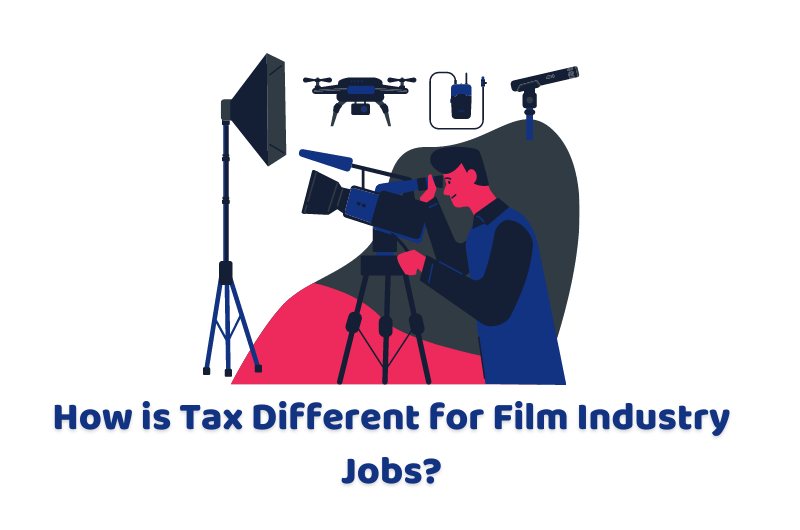If you are associated with the film industry, you must have the idea that being a freelancer in this industry is actually a big factor. This is especially for the individuals who are working behind the screen. The case of the general self-employed workforce is different in this scenario. This is because the employment status, in this case, is more defined than the self-employed people. The case of the film industry for self-employed people is entirely a different scenario. This is because some of the people pay taxes through PAYE and others will have to pay the tax after filing the tax returns. Even if the cases in both terms are considered to be self-employed workers. This discussion, however, is totally based on a tax on film industry jobs. Let us get delved into the discussion to know better.
AccountingFirms can assist you in managing your business and accounting problems as well as avail maximum tax relief possible.
What is Pay as You Earn (PAYE)?
This is a common understanding, that PAYE is the abbreviation of pay as you earn. This is a purely designed system to ensure that the employees pay the income tax and the national insurance for whatever amount they owe to HMRC. This amount is deducted before the wages are received by the employees. If you are associated with an organisation as an employee, the chances are that you will be paying tax through the PAYE system.
However, in the case of being assisted with the film industry as a freelancer, you will pay the production amount through PAYE even though your employment status is not of an employee. The rules of this industry are about different when it comes to paying taxes.
If you are an employee, you will have to pay the following mentioned payments through the PAYE system:
- The loan you availed as a student.
- And the pension contributions.
Are PAYE Film Industry Jobs the Same as Employment?
There is no doubt that the PAYE film industry jobs are never the same as the employment jobs. Most of the jobs related to the film industry are based on a contract system. These are short-term contracts with freelancers. This is because of the limited and short duration of production. This could be a film or a television programme in this regard. Some other productions are for finite periods. For example for the duration of 90 days. You must review the employment status in this case as the new agreement will be different than the old one.
What are Related Employee Benefits?
Being associated with the film industry, if you are getting wages through the PAYE system, your status will still be different than the regular and permanent employees. This is why the benefits of the permanent employees will have no access to you. These benefits might include the followings:
- The pay of a holiday which is known as a paid holiday will not be entertained to you because of having a freelancer status.
- You will have to plan the future on your own because of the no pension contribution plan.
- You will have less job security as the work permit can be cancelled at any moment stand there will be no redundancy in this case.
What are Film Industry Jobs that are Not PAYE?
There are some people who are associated with the industry but there is no deduction from the wages through any PAYE system. In such a case, you will have to take charge of doing your self-assessment on your own and doing the tax returns on the wages you are earning through this job. You will have to pay the national insurance for class 4 and class 2 along with the payment of national insurance if you are self-employed. This also depends on how much you are earning which will decide the rate of your income tax.
What are Film and TV Industry Expenses?
This is quite good news for the freelancers who are connected with the film industry as they are allowed to get the expenses deducted from their wages. However, not all the expenses are allowable to deduct and are not considered by HMRC in this case. Anything that is convincing technically can be debated. If you have authentic proof that the expenses are related to the business and work, you are allowed to deduct them from the earnings. Common examples of such expenses are props, lighting, printers, camera equipment, computer software, laptops, computers, and accounting costs etc.
The Bottom Line
Now that you have gathered a fair amount of information about what is the tax on film industry jobs and how it works differently than other industries in the UK, we can bring the discussion towards wrapping up. Tax is always different from the jobs related to the film industry. However, it is imperative to have an understanding of what is your employment status and how to deal with what you actually owe to HMRC in the form of national insurance and income tax. We hope these few minutes of reading will help you to develop a better understanding of tax on film industry jobs and how to handle it professionally for maximum benefits.
We are committed to delivering exceptional accounting services to our valuable clients in the UK to ensure they get the most professional solution to queries about accounting and taxation in the UK.
Disclaimer: All the information provided in this article on tax on film industry jobs, including all the texts and graphics, is general in nature. It does not intend to disregard any of the professional advice.

